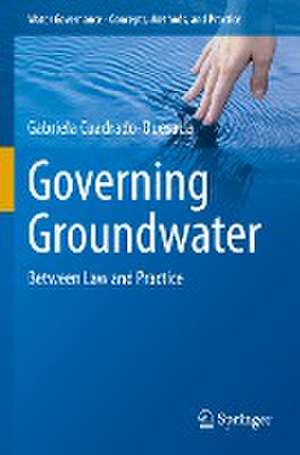Governing Groundwater: Between Law and Practice: Water Governance - Concepts, Methods, and Practice
Autor Gabriela Cuadrado-Quesadaen Limba Engleză Paperback – 18 mar 2023
| Toate formatele și edițiile | Preț | Express |
|---|---|---|
| Paperback (1) | 721.63 lei 6-8 săpt. | |
| Springer International Publishing – 18 mar 2023 | 721.63 lei 6-8 săpt. | |
| Hardback (1) | 727.48 lei 6-8 săpt. | |
| Springer International Publishing – 17 mar 2022 | 727.48 lei 6-8 săpt. |
Preț: 721.63 lei
Preț vechi: 880.05 lei
-18% Nou
Puncte Express: 1082
Preț estimativ în valută:
138.09€ • 144.54$ • 114.93£
138.09€ • 144.54$ • 114.93£
Carte tipărită la comandă
Livrare economică 31 martie-14 aprilie
Preluare comenzi: 021 569.72.76
Specificații
ISBN-13: 9783030927806
ISBN-10: 3030927806
Pagini: 169
Ilustrații: XV, 169 p. 16 illus., 15 illus. in color.
Dimensiuni: 155 x 235 mm
Greutate: 0.27 kg
Ediția:1st ed. 2022
Editura: Springer International Publishing
Colecția Springer
Seria Water Governance - Concepts, Methods, and Practice
Locul publicării:Cham, Switzerland
ISBN-10: 3030927806
Pagini: 169
Ilustrații: XV, 169 p. 16 illus., 15 illus. in color.
Dimensiuni: 155 x 235 mm
Greutate: 0.27 kg
Ediția:1st ed. 2022
Editura: Springer International Publishing
Colecția Springer
Seria Water Governance - Concepts, Methods, and Practice
Locul publicării:Cham, Switzerland
Cuprins
Introduction.- Invisible Water Law and Governance - At Heart of Equity and Sustainability Concerns.- Groundwater Overexploitation, Changing Crops, a New Wine Region and Legally Binding Allocation Plans.- Climate Change Effects and Non-Legally Binding Groundwater Plans to Improve the Governance of Hidden Waters.- A Cutting-edge Water Law, Strong Water Institutions and the Problem of Groundwater Excess.- When is Enough, Enough? Environmental Annihilation, Social Exploitation, Chemicals Running Through Groundwater and A Legal-Mix.- A Sandy-beach Paradise, Groundwater Exploitation and Groundwater Governance Through Communal Water Boards.- Groundwater, Bans on free Grazing, Tree Felling and Drilling Wells.- Between Law and Practice.- Conclusion.
Notă biografică
Gabriela Cuadrado Quesada is Lecturer/Researcher of Water Law and Justice at IHE-Delft, which she joined in 2017. Her research and teaching activities focus on the legal and institutional dimensions of water at both the local and national levels, the role of community organizations in using legal instruments to promote water/environmental justice and sustainability, the connections between community water practices and legal instruments, the relations between environmental destruction, food production, and water pollution, as well as the linkages between international human rights law, international humanitarian law, and international refugee law. She is also member of various international and national organizations which work on topics relating to water, environmental justice, and protection of the environment. Prior to joining IHE Delft, Gabriela was Ph.D. Fellow at the University of New South Wates (UNSW). Her doctoral research focusses on groundwater governance looking in particular at how the design and implementation of legal frameworks shape groundwater governance in practice; and how and to what extent law and practice are interwoven. Additionally, she has extensive experience working for various non-governmental organizations in Costa Rica and India and as an environmental litigator in Costa Rica. Gabriela holds a M.Sc. in Water and Coastal Management and Environmental and Infrastructure Planning from the University of Oldenburg (Germany) and the University of Groningen (The Netherlands). She also holds a M.A. in Human Rights and Education for Peace from the National University of Costa Rica. She obtained her Law Degree at the University of Costa Rica.
Textul de pe ultima copertă
This book empirically examines a diverse range of groundwater issues and different approaches to deal with such concerns taking into account responses from government bodies, community organizations, scientists, private sector, and academia. The overarching objective of this book is to empirically examine groundwater governance and groundwater law. It aims to provide a better understanding of the complexities surrounding groundwater governance in order to reconceptualize and retheorize the governance of subterranean resources having as entry points equity and sustainability concerns. This involves understanding what people do when using, sharing, protecting, and measuring groundwater; and why do they do what they do, i.e., what are their motivations to resort to certain practices. This is done through the comparative and contrasting investigation of six case studies from countries from the Global North and Global South. It offers a different perspective of literature given that it explains how groundwater governance and law are in practice rather than what they should be. Additionally, the research presented in this book provides ideas on how to rethink the design and implementation of groundwater law grounded on empirically based descriptions and the understanding of groundwater problems.
Caracteristici
Presents a unique perspective on how groundwater governance and law can be conceptualized and theorized Details different groundwater problems in six case studies from four countries and three continents Examines groundwater governance and groundwater law putting particular attention to 13 groundwater practices






